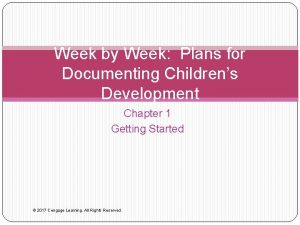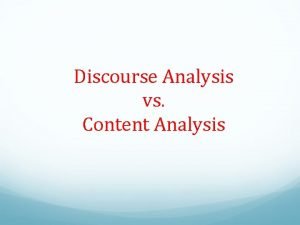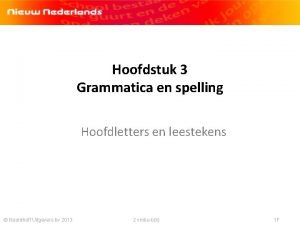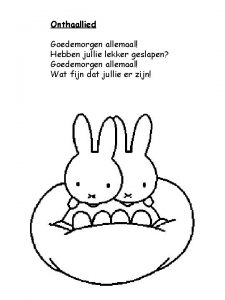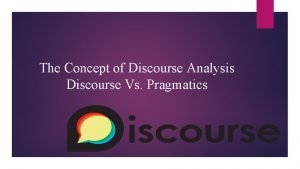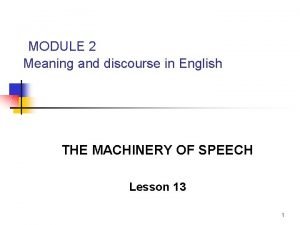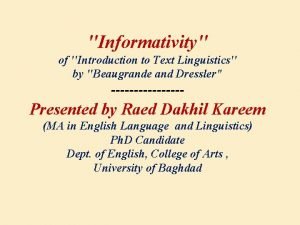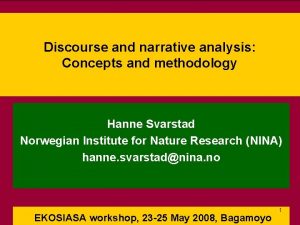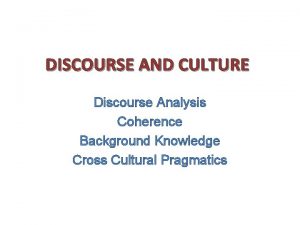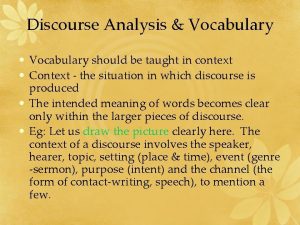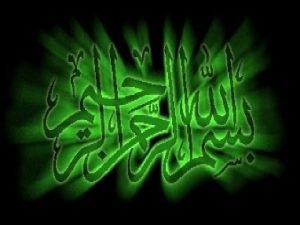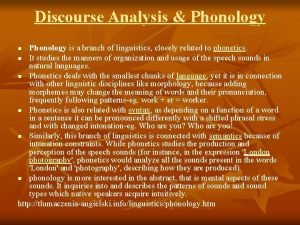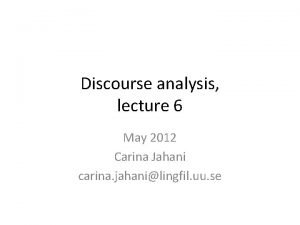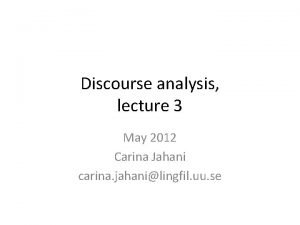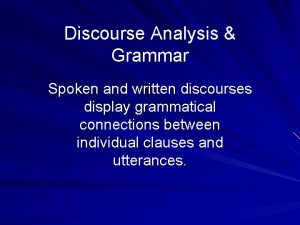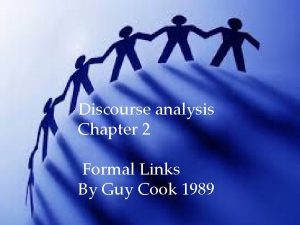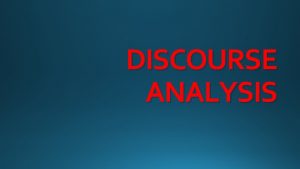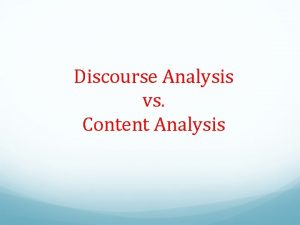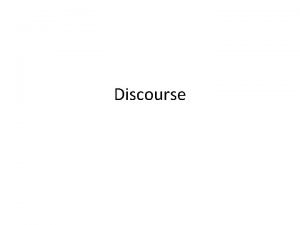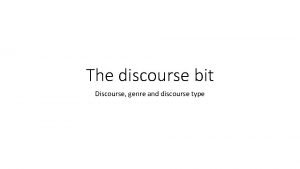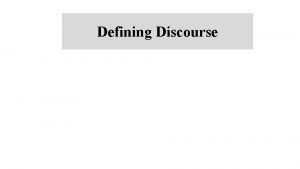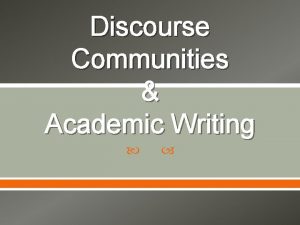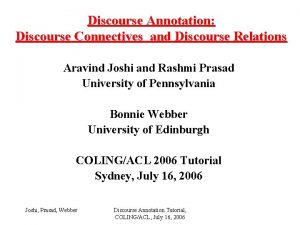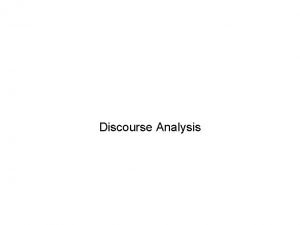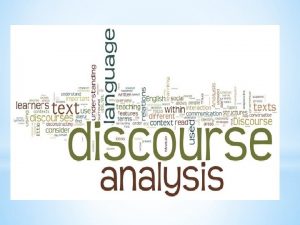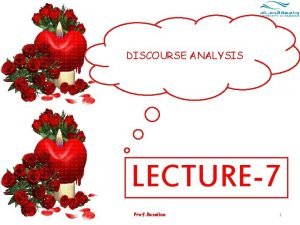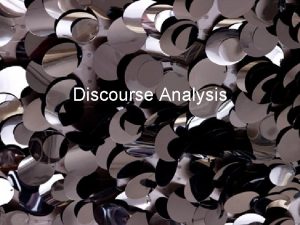Discourse Analysis Week 2 History of discourse van

















- Slides: 17

Discourse Analysis Week 2

History of discourse: van Dijk Rooted from the discipline of rhetoric There is a decline in this study as an independent academic New discipline (humanities and social sciences) arises 1928 : morphology of folktale (Vladimir Propp) >> structural analysis

� 1960 s : communication studies � Language in Culture and Society �Structuralism and ethnography to study language use �Generative – transformational grammar �Systemic grammar � 1970 s : speech acts and conversation analysis theories arise

�Discourse as discipline appeared in 1970 s �Critical discourse in 1980 s/1990 s They lied on ETHNOGRAPHY

Halliday : SFL

APPROACHES ON DISCOURSE STUDY FORMAL APPROACH (Discourse as Text) : EMPIRICAL APPROACH: • Formalism (Propp) • • Structuralism (Harris & Mitchell) • Interactional Sociolinguistics (Gumpers & Coulthard) • Goffman) • Ethnography of Communication (Hymes) • SFG (Halliday) • Text Linguistics (van Dijk, Beugrande) • Pragmatic approaches • Therapeutic discourse (Labov & Fanshel) • Social-psychological discourse (Potter & Wetherell) Classroom analysis (Sinclair and Conversation Analysis/Ethnomethodology (Garfinkel, Schegloff) CRITICAL APPROACH • Critical Linguistics ( Fowler et al. ; Kress and Hodge) • Pệcheux

LIMITATIONS OF THE APPROACHES 1. Formal approaches • do not attend to the ideological character; • insufficietly develop in its social orientation to discourse. 2. Empirical approaches • Absence of a developed social orientation in failing to consider how relations of power have shaped discourse practices, and in failing to situate classroom discourse historically in processes of social struggle and change. 3. • • • Critical linguistics Too much emphasis upon text as product, and too little emphasis upon the process of producing and interpreting texts; Too much emphasis upon effect of discourse in the social reproduction and neglects the role of discourse as a domain of social struggle and social change; Too little emphasis upon the issue of language-ideology interface; Has dealt mainy on written monologue and little to say about ideologically important aspects of the organization of spoken dialogue; Neglects process of interpretation, so the emphasis in heavily upon the realization of ideologies of texts.

Discourse vs Pragmatics: Joan Cutting �They study language in-use �They study language relation to contextual background �They study context, and function

Context �Meanings of words in interaction �Interactors communicate more meanings that the words say

Text �How the word relate to each other within the text �Coherence vs relevance

Function �What purposes are intended �What speakers want to do with the use of language

Discourse vs Pragmatics �Structure of the text �Social principles of discourse

Discourse Analysis in a nuthsell

Anlysing social themes using social theory Social analysis Discourse analysis Text d analysi s Concerning with continuity and change between what happens in a text and ‘order of discourse’ Covering analysis of Social tructure; social practice; social events Analysing linguistic elements of a text and seeing the text in terms of the different discourses, genres, and styles they draw upon

LANGUAGE AND SOCIETY 1. Language is a part of society - (A part of social structure) - ( Linguistic phenomena are social phenomena of a special sort) - (Social phenomena are (in part) linguistic phenomena) 2. Language is a social process (Process of producing meaning/text and of interpreting meaning/text) 3. Language is a socially conditioned process. - The process of production and the process of interaction is conditioned by other-nonlinguistic, parts of society - They are stored in people’s head cognitively as Members’ Resorces (MR). - They are socially generated (Language and Power : 19 -21)

SOCIAL STRUCTURE, SOCIAL PRACTICES, AND SOCIAL EVENTS A. SOCIAL STRUCTURE: - Very abstract entities - Potentials - Sets of possibilities - (an economic structure, a social structure, a kinship system, a language system) B. SOCIAL EVENTS: - What actually happens - ( Texts ) C. SOCIAL PRACTICES: - intermediate organizational entities between structures and events - ways of controlling the selection of certain structural possibilities and exclusion of others - are networked together in particular and shifting ways. - ( practices of teaching and practices of management in educational institution)

Orders of Discourse as an element of Social Practices SOCIAL STRUCTURES: languages SOCIAL PRACTICES : orders of discourse SOCIAL EVENTS : texts LANGUAGES : an abstract social structure that is a certain ways of combining linguistic elements that results a potential and possible forms and excludes the others. Orders of discourse: a network of social practices in its language aspect. Text : verbal element of social event.
 What is discourse
What is discourse Week by week plans for documenting children's development
Week by week plans for documenting children's development Content analysis discourse analysis
Content analysis discourse analysis Leestekens schema
Leestekens schema Goedemorgen allemaal en klap maar mee
Goedemorgen allemaal en klap maar mee Context of interpretation
Context of interpretation Pragmatics analysis
Pragmatics analysis Insertion sequence in discourse analysis
Insertion sequence in discourse analysis Informativity
Informativity Difference between discourse and narrative analysis
Difference between discourse and narrative analysis Background knowledge context
Background knowledge context Reiteration in discourse analysis
Reiteration in discourse analysis What is discourse
What is discourse Discourse analysis and phonology
Discourse analysis and phonology Deixis in discourse analysis
Deixis in discourse analysis Foregrounding and backgrounding in discourse analysis
Foregrounding and backgrounding in discourse analysis Discourse analysis and grammar
Discourse analysis and grammar Contextual links in discourse analysis
Contextual links in discourse analysis

